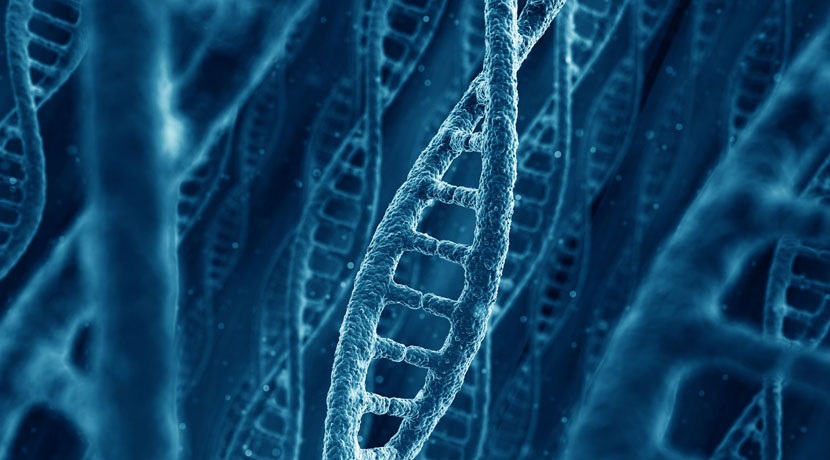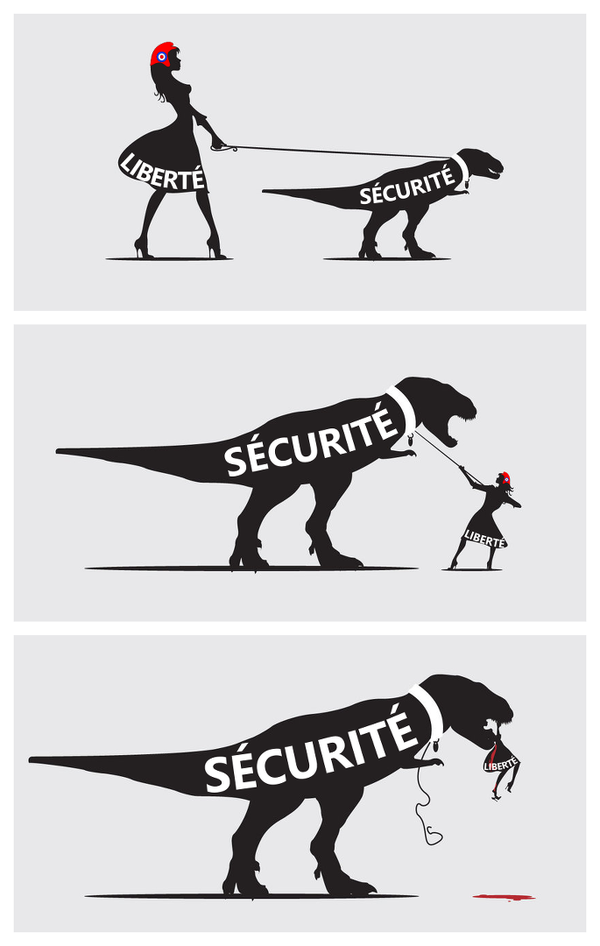Genetic Surveillance: For Progress or Profit?
With the release of the Panama Papers, it’s a good time to consider the idea of raw data. The more technological and scientific progress we make, the more that once-inscrutable elements of nature and society can be refined into more precise units of data that can be converted into useable information. What was once a transaction written into a ledger book is now a transaction stored in a database of purchases. What was once a piece of bubblegum littering the sidewalks is now ripe with personal identity in the form of decodable genetic material. With increased sources of personal data comes more information to protect from entering the wrong hands—and a higher premium on privacy.

 The balance between freedom and national security (image via Reddit)[/caption]
But the dark side is the unauthorized use of this information, which can be used for nefarious purposes. Profit-driven companies, with data provided by our Internet browsing behavior and shopping profiles, can peddle even more targeted products and even worse, allow for genetic discrimination based on one’s markers and propensities coded in their genome. UNESCO (the UN Educational, Scientific, and Cultural Organization) in both the Universal Declaration on the Human Genome and Human Rights (1997) and the International Declaration on Human Genetic Data (2003) has specified that genetic characteristics and genomic data should not be used to discriminate in a way that “infringes human rights, fundamental freedoms or human dignity” of an individual, a family, a group, or of communities. In 2008 the United States passed the Genetic Information Nondiscrimination Act to prohibit health insurance companies from making coverage decisions based on one’s genetic propensity for certain conditions and to prohibit employers from discriminating against employees for such genetic information related to health. In fact, of the G7 countries, Canada is the only one that doesn’t have such a regulation in place, although a similar bill has been proposed in the Canadian Senate.
Companies like 23AndMe, which brands its service as something for individual consumers, is amassing a biobank of personal genetic information that could be sold the same way Google sells search information. Writing in Biopolitical Times, Elliot Hosman names the “drivers of the genomics business model: Mass data collection and brokering data access.” As Jesse Reynolds wrote in 2010 at Psychology Today, “I’ve long been of the mind that, just as the traditional business model of newspapers is to get revenue not from readers but from advertisers, personal genomics companies see the potential profit not from the consumers themselves but from the compiled databases—likely in the form of selling access to them.” While 23AndMe disputes this, and while it now partners with researchers to provide them genetic data “by consent only,” the fact that the information is in their hands is a willing allocation of power from the individual to them.
Genetic surveillance does help solve some crimes, but at the cost of amassing a huge collection of private information—leading us to engage in similar debates as those in the aftermath of NSA’s warrantless surveillance and Apple’s refusal to help the FBI unlock the iPhone of one of the San Bernardino terrorists. The FBI’s CODIS (Combined DNA Index System), a collection of DNA profiles from federal, state, and local forensic laboratories that includes DNA from “convicted offenders, arrestees, legal, detainees, forensic (casework), unidentified human remains, missing persons, and the relatives of missing persons,” can be used to search for the identity that matches with the DNA of a suspected perpetrator of a crime. However, in the UK, and in US states that allow familial searching, one’s DNA profile doesn’t have to be in the database for them to be found and approached. The FBI defines it as “a deliberate search of a DNA database conducted for the intended purpose of potentially identifying close biological relatives to the unknown forensic profile obtained from crime scene evidence.” This means even if one is not convicted, and ostensibly innocent of any crime, upon arrest, their genetic material is collected for the database. (This has been ruled a violation of European privacy guarantee in Britain by the European Court of Human Rights.)
This 2009 article on Slate further describes the implications on a system that routinely profiles and arrests more blacks and Hispanics: “African-Americans, by several estimates, represent about 13 percent of the US population but 40 percent of the people convicted of felonies every year…Hank Greely of Stanford Law School has estimated that 17 percent of African-American citizens could be identified through familial searches, as opposed to only 4 percent of the Caucasian population. Once the implications of the racial disparity become clear, there may be a reaction against ever-more-expansive forms of DNA collection that makes the debate about racial profiling look tame.”
To highlight the creepy and insidious present-day dangers of genetic surveillance, in 2013, artist Heather Dewey-Hagborg used DNA collected from fingernails and hair, discarded cigarette butts, and littered chewing gum to create facial models of the person who left these samples behind in a series called “Stranger Visions.” She followed this work with “Be Invisible” in 2014, a set of sprays (for which she provides the instructions–mostly bleach) for erasing one’s DNA samples.
Genetic material like DNA can theoretically survive for a million years under the right conditions, and in light of all the applications of this information in the hands of different societal actors, that’s a scary thought. While genetic research, like the Internet and big data, has furthered human society and wellbeing, there is no denying there will be those with or without malicious intent who will use it while infringing on our personal liberties. For too long we’ve tuned out the amount of information we’re leaving behind in our litter and bodily shedding—and too permissive in letting others obtain our genetic information.
The balance between freedom and national security (image via Reddit)[/caption]
But the dark side is the unauthorized use of this information, which can be used for nefarious purposes. Profit-driven companies, with data provided by our Internet browsing behavior and shopping profiles, can peddle even more targeted products and even worse, allow for genetic discrimination based on one’s markers and propensities coded in their genome. UNESCO (the UN Educational, Scientific, and Cultural Organization) in both the Universal Declaration on the Human Genome and Human Rights (1997) and the International Declaration on Human Genetic Data (2003) has specified that genetic characteristics and genomic data should not be used to discriminate in a way that “infringes human rights, fundamental freedoms or human dignity” of an individual, a family, a group, or of communities. In 2008 the United States passed the Genetic Information Nondiscrimination Act to prohibit health insurance companies from making coverage decisions based on one’s genetic propensity for certain conditions and to prohibit employers from discriminating against employees for such genetic information related to health. In fact, of the G7 countries, Canada is the only one that doesn’t have such a regulation in place, although a similar bill has been proposed in the Canadian Senate.
Companies like 23AndMe, which brands its service as something for individual consumers, is amassing a biobank of personal genetic information that could be sold the same way Google sells search information. Writing in Biopolitical Times, Elliot Hosman names the “drivers of the genomics business model: Mass data collection and brokering data access.” As Jesse Reynolds wrote in 2010 at Psychology Today, “I’ve long been of the mind that, just as the traditional business model of newspapers is to get revenue not from readers but from advertisers, personal genomics companies see the potential profit not from the consumers themselves but from the compiled databases—likely in the form of selling access to them.” While 23AndMe disputes this, and while it now partners with researchers to provide them genetic data “by consent only,” the fact that the information is in their hands is a willing allocation of power from the individual to them.
Genetic surveillance does help solve some crimes, but at the cost of amassing a huge collection of private information—leading us to engage in similar debates as those in the aftermath of NSA’s warrantless surveillance and Apple’s refusal to help the FBI unlock the iPhone of one of the San Bernardino terrorists. The FBI’s CODIS (Combined DNA Index System), a collection of DNA profiles from federal, state, and local forensic laboratories that includes DNA from “convicted offenders, arrestees, legal, detainees, forensic (casework), unidentified human remains, missing persons, and the relatives of missing persons,” can be used to search for the identity that matches with the DNA of a suspected perpetrator of a crime. However, in the UK, and in US states that allow familial searching, one’s DNA profile doesn’t have to be in the database for them to be found and approached. The FBI defines it as “a deliberate search of a DNA database conducted for the intended purpose of potentially identifying close biological relatives to the unknown forensic profile obtained from crime scene evidence.” This means even if one is not convicted, and ostensibly innocent of any crime, upon arrest, their genetic material is collected for the database. (This has been ruled a violation of European privacy guarantee in Britain by the European Court of Human Rights.)
This 2009 article on Slate further describes the implications on a system that routinely profiles and arrests more blacks and Hispanics: “African-Americans, by several estimates, represent about 13 percent of the US population but 40 percent of the people convicted of felonies every year…Hank Greely of Stanford Law School has estimated that 17 percent of African-American citizens could be identified through familial searches, as opposed to only 4 percent of the Caucasian population. Once the implications of the racial disparity become clear, there may be a reaction against ever-more-expansive forms of DNA collection that makes the debate about racial profiling look tame.”
To highlight the creepy and insidious present-day dangers of genetic surveillance, in 2013, artist Heather Dewey-Hagborg used DNA collected from fingernails and hair, discarded cigarette butts, and littered chewing gum to create facial models of the person who left these samples behind in a series called “Stranger Visions.” She followed this work with “Be Invisible” in 2014, a set of sprays (for which she provides the instructions–mostly bleach) for erasing one’s DNA samples.
Genetic material like DNA can theoretically survive for a million years under the right conditions, and in light of all the applications of this information in the hands of different societal actors, that’s a scary thought. While genetic research, like the Internet and big data, has furthered human society and wellbeing, there is no denying there will be those with or without malicious intent who will use it while infringing on our personal liberties. For too long we’ve tuned out the amount of information we’re leaving behind in our litter and bodily shedding—and too permissive in letting others obtain our genetic information.
